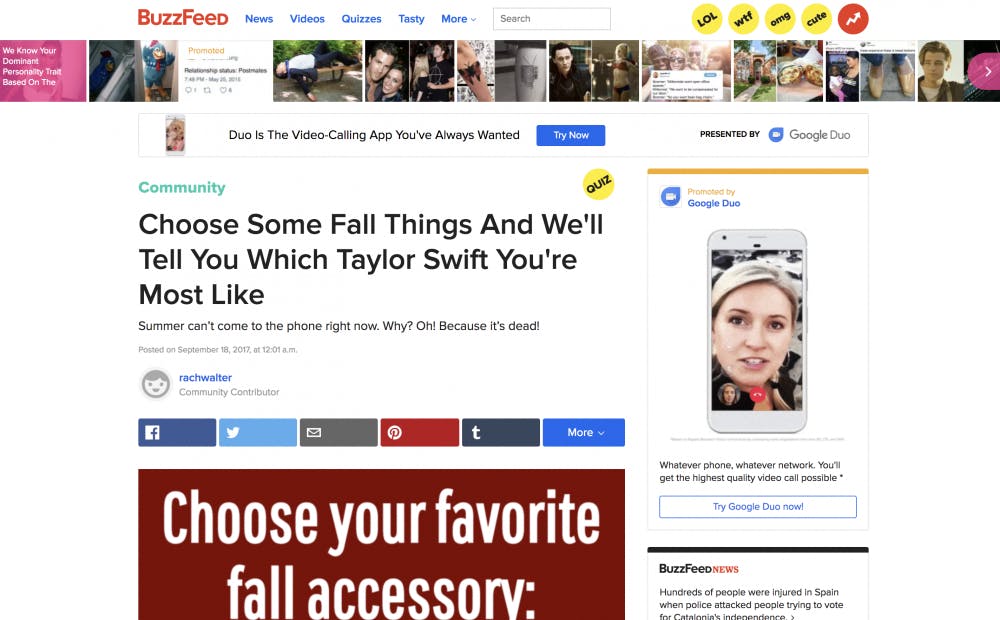
In one Wharton class, teams of students compete for clicks on BuzzFeed quizzes that they created. Occasionally, these quizzes go viral.
On Sept. 28, students in the Wharton class “Advertising Management” presented the results of their week-long viral media assignment. The top quiz, titled “Choose Some Fall Things And We'll Tell You Which Taylor Swift You're Most Like,” gained almost 300,000 views. Each team's quiz had to receive at least 1,000 legitimate views to reach the minimum requirement.

This was the first year marketing professor Keith Niedermeier assigned this project, which he designed as a way for his students to utilize the concepts learned in class. Although several quizzes were accepted by Buzzfeed editors and posted on BuzzFeed’s website, this only accounted for a baseline number of 25,000 views.
“Anything in excess of that is really reflecting the quality of the content, the quality of the targeting and the viral efforts that are being made outside,” Niedermeier said.
Niedermeier also said that these results “far eclipsed” those of students in the graduate-level version of this course, who have been assigned a similar project in the past.
“I didn’t know what to expect because I looked at what the MBAs did and it was nowhere near this. A lot of them fell pretty flat,” Niedermeier said.
In the graduate course, students did not have the freedom to choose the topic of their projects, which Niedermeier said likely accounts for the greater success of the undergraduate students.
Wharton junior Chrissy Walker, who was on the winning team, also attributed her success to her ability to personalize her quiz.
“Fall and Taylor Swift are definitely peaking right now in terms of popularity and mention, so we wanted to pick a topic we could personally relate to," Walker said. "We’re young girls. We know about Taylor Swift, and we know about pumpkin spice lattes and how there are fall 'basic' things."
This personalization also gave the team international success: while the quiz obtained 174,000 views in the United States, it received 291,000 throughout the world.
Walker said that the quiz gained the views it did because the group properly sought out a “target” audience and correctly determined the “triggers” that would engage them.
These terms originated in the book entitled “Contagious” by Wharton professor Jonah Berger, which presented the viral framework called "steps." In “Advertising Marketing,” Niedermeier teaches students how to apply these concepts.
College junior Annie Batsaikhan was a part of a group whose quiz, “How Much Of Your S#*t Would You Sell For The iPhone X?” , garnered 1,400 views. Batsaikhan said her group's relatively low turnout was a result of their misestimating the target audience.
The quiz has users check options such as, "get rid of you your Netflix account," "fake a fall and sue" and "sell your forehead as advertising space." The results would reveal a monetary estimate of the amount you would pay for the "iPhone X."
"I think we missed the target audience of BuzzFeed with our ironic and dark humor,” Batsaikhan said.
Niedermeier said that even for the students who received a low number of views on their quizzes, many of them demonstrated a good understanding of the concepts taught in class, which is the ultimate goal of the class.
"I like how hands-on it is," Batsaikhan said."We’re not getting lectured at for the whole time. We can actually implement the stuff that we learned in class into social media.”
The Daily Pennsylvanian is an independent, student-run newspaper. Please consider making a donation to support the coverage that shapes the University. Your generosity ensures a future of strong journalism at Penn.
Donate






